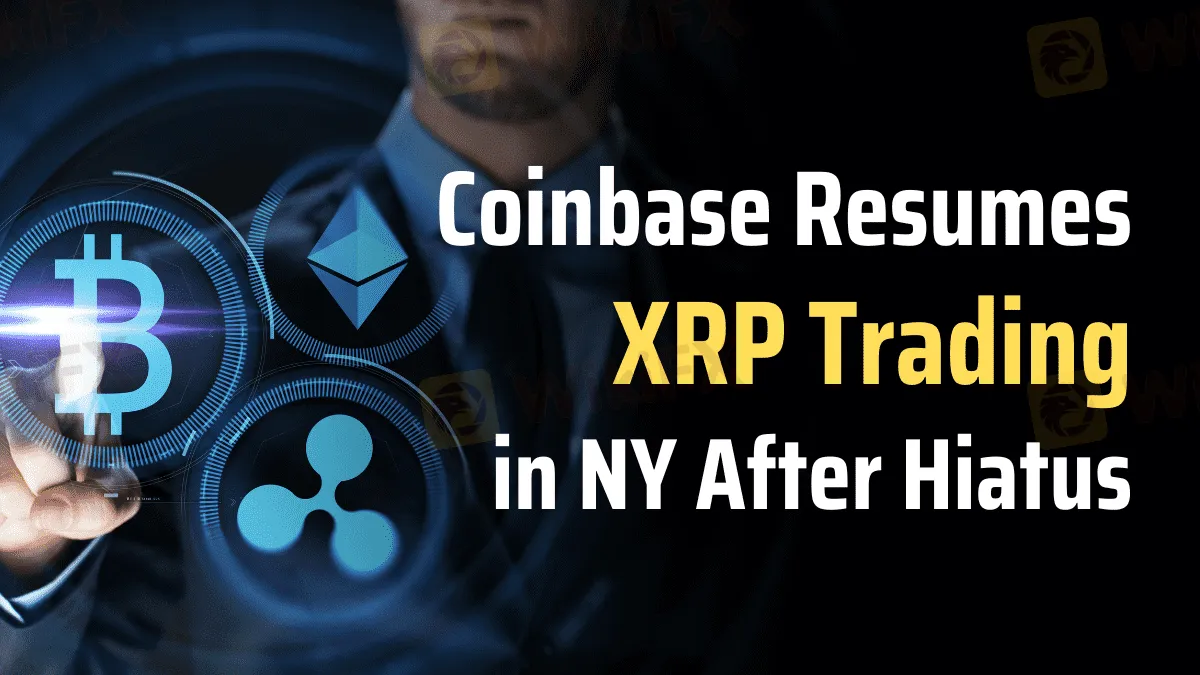简体中文
繁體中文
English
Pусский
日本語
ภาษาไทย
Tiếng Việt
Bahasa Indonesia
Español
हिन्दी
Filippiiniläinen
Français
Deutsch
Português
Türkçe
한국어
العربية
Coinbase Resumes XRP Trading in NY After Hiatus
Abstract:XRP trading on Coinbase is available again in New York following a nine-month suspension due to regulatory scrutiny.

Officially, Coinbase has started trading XRP again in New York, ending a nine-month ban brought on by a regulatory investigation. Chief legal officer Paul Grewal of the corporation highlighted this noteworthy development on Thursday.
Grewal broke the story in a quick social media post, saying, “XRP trading on Coinbase is available again in NY.” After listening to you, we worked hard in close collaboration with the state. We are back online, so now the message may be spread. Cryptos have had a tough time navigating the regulatory landscape, so this is a huge step forward.
Trading in XRP on Coinbase in New York was halted in September 2023 when the New York Department of Financial Services (NYDFS) decided to take Ripple Labs off of its “Greenlist” of authorized custodians. This legislative action forced Coinbase to stop providing XRP to New Yorkers. Approval by the NYDFS to function as custodians in the state guarantees adherence to strict regulatory requirements for cryptocurrency companies.

New York Coinbase's IPO of XRP was met with a positive market reaction. With the news, the price of XRP increased from $0.51 to about $0.53. Through this short increase, XRP has been under downward pressure, falling from its most recent high of $0.74 on March 12, 2024.
The ongoing legal battle between Ripple Labs and the SEC in the US serves as the backdrop for this development. The SEC has been suing Ripple for a long time, claiming that XRP ought to be categorized as a security and fall within the regulatory authority of the organization. The legal procedures significantly impact the cryptocurrency market and the way exchanges deal with XRP.
A turning point in this lawsuit came when a federal court granted the SEC permission to contest a decision that said XRP was not a security when it was offered to the public. Even if Ripple won this decision momentarily, the SEC's appeal shows that the regulatory uncertainty is far from over.
The decision in this case will determine whether the SEC has authority over cryptocurrencies and if they will be subject to rules similar to those that control equities and bonds. Since 2020, when Ripple was sued by the SEC, the central dispute has been whether the business should have notified its XRP sales to the Commission. Exchanges are now wary to link with assets that are being inspected by the authorities because they are worried about facing penalties and litigation should XRP sales turn out to be unregistered securities.
The choice by Coinbase to start trading XRP again in New York shows a measured risk and their trust in their relationships and regulatory compliance initiatives. This further highlights the complexity and dynamic nature of the Bitcoin regulatory environment.
The cryptocurrency industry will closely monitor the lawsuit between the SEC and Ripple Labs for any implications that may affect the bigger market. For the time being, the restoration of XRP trading on Coinbase in New York is a key milestone in the ongoing saga of XRP's market performance and regulatory difficulties.

Disclaimer:
The views in this article only represent the author's personal views, and do not constitute investment advice on this platform. This platform does not guarantee the accuracy, completeness and timeliness of the information in the article, and will not be liable for any loss caused by the use of or reliance on the information in the article.
Read more

Will natural disasters have an impact on the forex market?
The forex market is known for its rapid responses to global events, but the influence of natural disasters, such as earthquakes and typhoons, can be less straightforward. While headlines may scream about catastrophic damage and economic disruption, the long-term effects on currency values often depend on a blend of immediate shock and underlying economic fundamentals.

Navigating the Intersection of Forex Markets, AI Technology, and Fintech
The financial world is transforming, driven by the rapid integration of artificial intelligence (AI) and innovative fintech solutions. This change is most apparent in forex markets, where algorithmic trading and deep learning are redefining strategies, risk management, and decision-making. In this article, we explore how AI-driven technologies are not only revolutionizing forex trading but are also propelling fintech innovations that enhance customer experiences, bolster security, and unlock new market opportunities.

The One Fear That’s Costing You More Than Just Profits
The fear of missing out (FOMO) is NOT what you think it is! Read the three lesser-discussed components that contribute greatly to FOMO trading!

SocialFi and the Forex Market: A New Era for Decentralized Social Trading?
The worlds of social media and decentralized finance (DeFi) have converged under a new banner—SocialFi. Short for “Social Finance,” SocialFi leverages blockchain technology to reward user engagement, giving individuals direct control over their data and interactions. While SocialFi has primarily emerged in the context of content creation and crypto communities, its principles could soon revolutionize the forex market by reshaping how traders share insights and monetize social influence.
WikiFX Broker
Latest News
How Crypto Trading Transforms FX and CFD Brokerage Industry
UK would not hesitate to retaliate against US tariffs - No 10 sources
FCA Warns Against 10 Unlicensed or Clone Firms
CySEC Warns Against 14 Unlicensed Investment Websites
Top Currency Pairs to Watch for Profit This Week - March 31, 2025
Will natural disasters have an impact on the forex market?
Philippines Deports 29 Indonesians Linked to Online Scam Syndicate in Manila
Navigating the Intersection of Forex Markets, AI Technology, and Fintech
Exposed: Deceptive World of Fake Trading Gurus – Don’t Get Fooled!
AI-Powered Strategies to Improve Profits in Forex Trading
Currency Calculator







